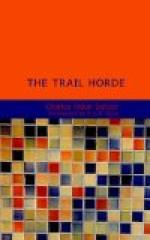But there was no doubt that a change had come over the big man. His shoulders sagged further. A suggestion of a mirthless smile began to tug at the corners of his mouth; he unclenched the fingers of his hands.
“It’s you, eh?” he said, gruffly. “My kid was sayin’ someone in the schoolhouse had walloped him, an’ I was aimin’ to find out who it was. I reckon he’s gone.”
“I walloped him, Singleton.”
Lawler’s voice was gentle. In it was still a trace of that quality that Ruth had sensed, softened now slightly by the knowledge that Singleton’s rage had slightly cooled.
“There isn’t a heap to be said, I reckon,” Lawler resumed as Singleton stood rigid again. “Your boy was trying to ‘wallop’ his teacher. I happened to look in, and I had to take a hand in it, just to keep things even. He had it coming to him, Singleton.”
Lawler’s manner was conciliatory, even mildly placative. “I figured on saving you a job, Singleton.”
Singleton’s face reddened.
“Lawler, I figger to lick my own kid.”
“Singleton, I reckon it can’t be undone, and you’ll have to make the best of it. You and I have never got along well, but I want you to know I didn’t know it was your boy I punished.”
“Hell’s fire!” snarled Singleton; “what you interferin’ in the schoolhouse for? What business you got buttin’ in?” It was dear that Singleton’s rage was again rising. He must have noticed that the pupils had crowded around the door, and that Jimmy was watching him, no doubt disappointed that the salutary punishment for which he had hoped had been unnecessarily delayed.
Undoubtedly the presence of the children contributed to Singleton’s anger; but at bottom was his old dislike of Lawler—a dislike that the incident of the whipping had increased to hatred.
It was plain that Singleton meditated violence. Yet it was equally plain that he feared Lawler. He never had seen Lawler draw a gun, but he had heard tales of the man’s ability with the weapon. There lingered in his mind at this minute—as it had dwelt during all the days he had known Lawler—the knowledge that Lawler’s father had been a gunman of wide reputation, and that he had taught his son the precision and swiftness that had made him famous in the deadly art.
That knowledge had always exerted a deterring influence upon Singleton; there had been times when he would have drawn a gun on Lawler had it not been that he feared the son might be as swift as the father.
So Singleton had assured himself; he was not afraid of Lawler, he was afraid of the reputation of Lawler’s father. Singleton was reluctant to admit that it was not Lawler’s gun that he was afraid of, but something that was in the man himself—in his confident manner, in the level glance of his eyes; in the way he looked at Singleton—seeming to hint that he knew the man’s thoughts, and that when the time came—if it ever came—he would convince Singleton that his fears were well founded.




